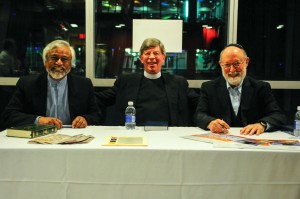Religious Leaders Spread Interfaith Dialogue

Staff Writer
The Interfaith Amigos spoke at Hudson Valley about the common ground between the three Abrahamic religions on Oct. 23.
“The Koran says if God wanted, he could have made all of us one single community, but God chose to make several for one essential reason: to come to get to know the other,” Imam Jamal Rahman said Thursday night.
Rahman, Pastor Don Mackenzie, and Rabbi Ted Falcon make up the Interfaith Amigos. The trio speak mainly to college campuses about Islam, Judaism, and Christianity, and the importance of interfaith dialogue. Their talk Thursday was sponsored by the campus ministry in collaboration with the Marvin Library.
“We’ve been working together for the past 14 years. We decided to work together after the tragic events of 9/11. The aftermath showed us how far we are from a peaceful solution to the world’s problems,” Mackenzie said.
They wanted to understand why interfaith dialogue wasn’t working, so they came together. “We brought our favorite texts with us,” Falcon said.
The three read aloud scripture in Hebrew, Arabic, and English simultaneously, prompting laughter from the audience. “That’s how it went for the first three years… We do that to illustrate the difficulties we had in truly listening to one another,” said Falcon.
“To listen to the wisdom that comes from another tradition requires us to look beyond our fears that somehow our own traditions will be undermined or watered down,” said Falcon.
The Amigos have developed five stages to create and promote interfaith dialogue. Step one is to see each other on a human level and to share the experiences of how religion has touched our lives. The second step is to encourage people of other faiths to share what they believe the core teachings of their religion are and why.
The third step is to compare what is the same and different in the core teachings of each faith and the scriptures that go along with or against the core teachings. The fourth step is the one that takes the most courage: entering into difficult faith-based discussions on controversial topics. The last step is to read other religious holy books for yourself and to make up your own mind from what you have read.
Falcon, Mackenzie, and Rahman also discussed how religion has strayed from its core teachings, which they identified as unconditional love in Christianity, compassion in Islam, and oneness, or unity, in Judaism.
The Interfaith Amigos noticed their respective religions going astray in four ways: when they promoted homophobia, gender inequality, exclusivity, and violence, usually stemming from exclusivity.
“All authentic spiritual paths lead to a shared universal, and that universal is greater than any one path. When any one path thinks they own the universal, then we are all in trouble,” Falcon said.
Falcon said that spiritual awareness and consciousness make up the Golden Rule or, as he likes to call it, the “Golden Reality, because it is an awareness, because we are connected, because we are sharing one life, one being, one mystery.”
“That which we do to others we do to ourselves. To harm one of us is to harm all of us and to serve one of us is to serve us all,” Falcon said.
“Spiritual consciousness is opening our heart, not only to those who share our beliefs, but to all,” Falcon said. “Spiritual awareness allows us to perceive the interconnectedness of all beings…[it] allows us to appreciate the sense of belonging to church, belonging to community, a sense of purpose and meaning to our lives.”
Mackenzie said that in the past when humanity has gone astray, “there have been [prophets] who have called us back” to the core teachings. “But things are different today. The paradigm has shifted. There were ages when we relied on people outside ourselves to teach us and call us back, but we’ve reached a state of spiritual maturity that comes with more responsibility. Mainly we’ve reached the point where we are conscious enough to call ourselves back.”
